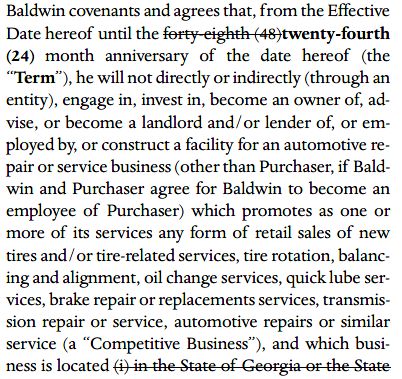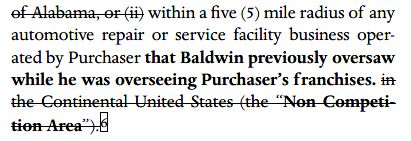In a recent decision, the Eleventh Circuit seemed to approve a more forgiving standard for reviewing restrictive covenants. Courts generally have three colors in their markup kit for restrictive covenants. The first—and most severe—is the red pencil. In those jurisdictions, if any aspect of a restrictive covenant is overbroad, the court strikes out the whole provision. The second—and most common—is the blue pencil. In blue-pencil jurisdictions, courts may strike out overbroad language but cannot add any language to make the covenant enforceable. The third—and most forgiving—is the purple pencil. These jurisdictions, also called "reformation" jurisdictions, allow a court to insert entirely new language into an overbroad restrictive covenant.
For example, assume that an employee has a non-compete that prevents the employee from providing similar services in Georgia, Florida, and Alabama, but the employee only had responsibilities in Georgia and Miami, Florida. Courts from each of these jurisdictions would likely analyze the non-compete as follows:
| Legal Framework | Outcome |
| Red Pencil | The covenant is not reasonable in its territory, because the employee's duties did not include the entire territory covered by the non-compete. The covenant is unenforceable. |
| Blue Pencil (strike out only) |
The covenant is not reasonable in its territory, because the employee's duties did not include the entire territory covered by the non-compete. However, the court can strike out Alabama and Florida to make the covenant enforceable. The court would likely refuse to prevent the employee from working in the entire state of Florida if the employee only performed work in part of the state. The revised covenant would prevent the employee from working in Georgia. |
| Purple Pencil (reformation) | The covenant is not reasonable in its territory, because the employee's duties did not include the entire territory covered by the non-compete. However, the court can strike out Alabama and Florida and add "Miami, Florida" to the non-compete, thus matching the territory where the employee actually worked to the territory covered by the non-compete. The revised covenant would prevent the employee from working in Georgia and Miami, Florida. |
But the Eleventh Circuit seemingly introduced a twist to this
framework in Baldwin v. Express Oil Change. There,
an auto repair franchisor sued an employee that had acquired
phantom equity in three companies which operated franchises. The
employee signed a non-compete in exchange for roughly $2 million
for his phantom equity.
The covenant provided that he would not, for a four-year period, "engage in, invest in, become an owner of, advise, or become a landlord and/or lender of, or employed by, or construct a facility for . . . a Competitive Business" within a defined "Non-Competition Area." The covenant defined a competitive business as:
an automotive repair or service business . . . which promotes as one or more of its services any form of retail sales of new tires and/or tire-related services, tire rotation, balancing and alignment, oil change services, quick lube services, brake repair or replacements services, transmission repair or service, automotive repairs or similar service.
The covenant defined the "Non-Competition Area" to include all of Georgia and Alabama, as well as "a five (5) mile radius of any automotive repair or service facility business operated by [Franchisor] in the continental United States."
Following the sale, the employee requested permission to operate a competing auto repair shop within five miles of a store operated by the franchisor. The franchisor refused, so the employee filed a declaratory judgment action in Georgia seeking to invalidate the non-compete.
The district court enforced a pared-back version of the
non-compete by reducing the temporal duration and the geographic
territory of the covenant. Here's the district court's
markup, with additions in bold and removed
language in strikethrough:


The franchisor appealed and argued the district court erred in its revisions to the non-compete. Notably, Baldwin did not cross-appeal the district court's revisions to the non-compete.
The court of appeals dismissed part of the appeal as moot, vacated the district court's decision to the extent it reduced the temporal duration of the non-compete, and affirmed the district court's revisions to the geographic territory.
The last holding is the most important. Here, the district court did more than just strike out language; the district court also added language to create an enforceable territory. The original non-compete covered "a five (5) mile radius of any automotive repair or service facility operation operated by [the franchisor] in the Continental United States." The district court revised that territory by striking out "the Continental United States" and adding the limitation that the five-mile radius included only locations "that [employee] previously oversaw while he was overseeing [the franchisor's] franchises." This revision would generally be classified not as blue-penciling the non-compete, but, rather reforming the non-compete.
The franchisor argued that the district court lacked authority to modify the non-compete as it did by adding new limitations "from whole cloth" when it narrowed the covenant. The court of appeals disagreed, noting that Georgia law authorizes courts to modify overbroad restrictions. However, the court of appeals did not specifically address the nature of the modification: adding language to limit the covenant to a reasonable geographic territory.
Key Takeaways
Although Baldwin dealt with the sale of all or substantially all of a business versus a pure employee/employer covenant, the decision hints that Georgia's blue pencil might be closer to purple. Prior cases directly held that "[b]lue penciling cannot cure [certain problems], for 'the "blue pencil" marks, but it does not write. It may limit an area, thus making it reasonable, but it may not rewrite a contract void for vagueness, making it definite by designating a new, clearly demarcated area." Perhaps covenants that are overbroad but not vague can be re-written to a greater degree than the prevailing viewpoint thought.
The decision should not, however, be viewed as license to draft extremely broad covenants because a court might save them. Blue-penciling covenants is entirely discretionary, and there is some tension between Baldwin and other decisions from Georgia courts regarding how much leeway courts have in modifying covenants.
If you or your company would like to discuss how this decision might impact your restrictive covenant program, please contact the authors or another member of Seyfarth's nationally recognized Trade Secrets team.
The content of this article is intended to provide a general guide to the subject matter. Specialist advice should be sought about your specific circumstances.


